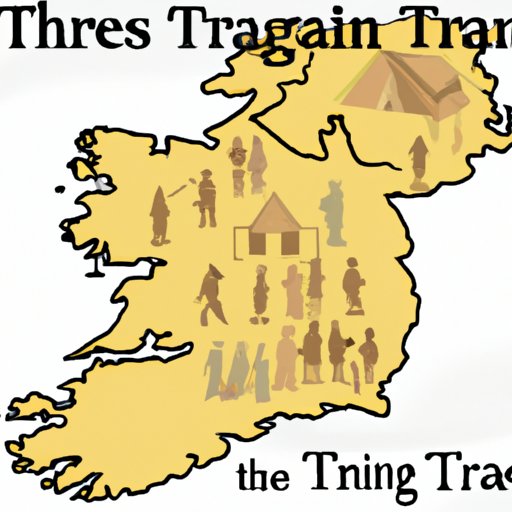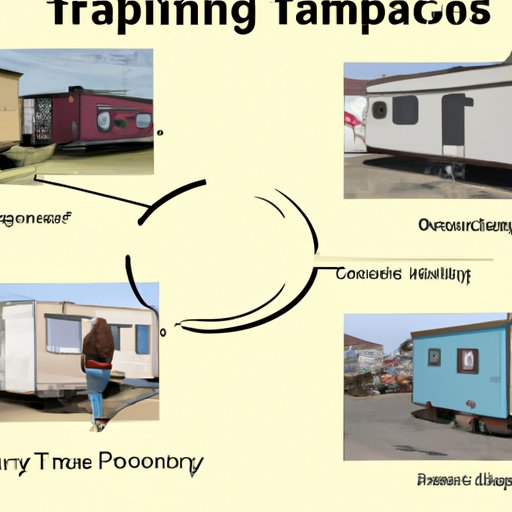Introduction
Irish Travellers are a distinct ethnic group who have been living in Ireland for centuries. They are a nomadic people who have traditionally travelled around the country in search of seasonal work. Despite their long history in Ireland, Irish Travellers are still facing discrimination and prejudice. This article examines the historical, cultural, economic and social experiences of Irish Travellers and provides recommendations on how to improve their situation.

Historical Overview of Irish Travellers
The origins of Irish Travellers are unclear, but it is believed that they are descended from an ancient Celtic people known as the “Tuatha Dé Danann”. Some historians also suggest that they are descended from members of the Romani people who migrated to Ireland during the Middle Ages. Over time, Irish Travellers developed their own distinct language and customs, which set them apart from the settled population.
Throughout their history, Irish Travellers have faced discrimination and prejudice. In the 19th century, they were seen as a nuisance by the settled population and were often forced to move on when they arrived in a new area. The Irish government also passed laws that made it difficult for Irish Travellers to find work or access public services. These laws were not repealed until the late 20th century.
Impact of Discrimination on Irish Travellers
The discrimination that Irish Travellers have faced throughout their history has had a significant impact on their lives. It has led to social and economic struggles, as well as a decline in traditional cultural practices and beliefs.
Social and Economic Struggles
Irish Travellers have traditionally relied on seasonal labour to make a living. However, due to the discrimination they have faced, they have often been denied access to jobs and other forms of employment. This has resulted in high levels of poverty among the Irish Traveller community.
In addition, Irish Travellers have often been denied access to public services such as education and healthcare. This has resulted in poorer health outcomes for Irish Travellers compared to the settled population. For example, a 2018 survey found that Irish Travellers were twice as likely to suffer from mental health problems such as depression and anxiety.
Cultural Practices and Beliefs
The discrimination that Irish Travellers have faced has also had a negative impact on their cultural practices and beliefs. Many of the traditional customs and beliefs of Irish Travellers have been lost over time, and some of the remaining practices have become less common.
For example, the traditional language of Irish Travellers, Shelta, is now rarely spoken. Similarly, many of the traditional music, dance and storytelling traditions of Irish Travellers have been lost or are in decline.
Examining the Cultural Traditions of Irish Travellers
Despite the decline in traditional customs and beliefs, Irish Travellers still maintain a strong sense of identity and culture. There are several cultural practices and beliefs that remain important to the Irish Traveller community.
Language and Customs
Irish Travellers still use Shelta, their traditional language, in everyday conversation. In addition, they continue to practice certain customs and beliefs, such as the “blessing of the hands” ceremony, which is performed before important events, such as weddings and funerals.
Music, Dance and Storytelling
Irish Travellers also continue to practice traditional music, dance and storytelling. Traditional Irish Traveller songs and stories are still passed down from generation to generation, and Irish Travellers still perform traditional dances at festivals and gatherings.

Exploring the Economic Struggles of Irish Travellers
Irish Travellers still face significant economic struggles due to discrimination and limited access to employment. According to a 2018 survey, the unemployment rate among Irish Travellers was more than double the national average.
In addition, Irish Travellers often struggle to access financial services such as loans and mortgages. This can make it difficult for Irish Travellers to purchase homes and start businesses.

Investigating the Social Status of Irish Travellers
Irish Travellers are still subject to stigma and prejudice in Irish society. They are often stereotyped as criminals or troublemakers, and there is still a lack of legal recognition of Irish Travellers as an ethnic group.
This lack of recognition makes it difficult for Irish Travellers to access services and benefits that are available to other ethnic groups. For example, many Irish Travellers are ineligible for certain welfare payments and housing assistance.
Assessing the Educational Experiences of Irish Travellers
Irish Travellers also face significant educational challenges. According to a 2018 survey, only 6% of Irish Travellers had completed secondary education, compared to the national average of 60%.
This low level of educational attainment is partly due to the discrimination that Irish Travellers have faced in schools. Irish Travellers often face bullying and harassment in school, and many drop out before completing their education.
Conclusion
Irish Travellers have a long history in Ireland, but they still face significant discrimination and prejudice. This has had a negative impact on their social and economic status, as well as their cultural practices and beliefs. Irish Travellers also face educational and employment struggles due to their lack of legal recognition and limited access to financial services.
In order to improve the situation of Irish Travellers, it is important to raise awareness about the discrimination they face and to ensure that they have access to services and benefits that are available to other ethnic groups. It is also important to promote the cultural traditions of Irish Travellers and to support efforts to increase educational attainment among Irish Travellers.
(Note: Is this article not meeting your expectations? Do you have knowledge or insights to share? Unlock new opportunities and expand your reach by joining our authors team. Click Registration to join us and share your expertise with our readers.)
